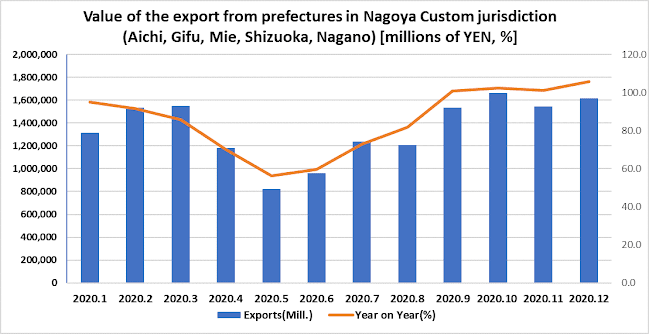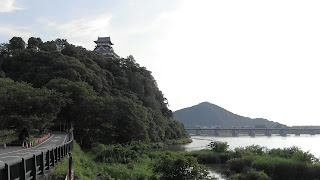Exports and manufacturing activities in the Chubu show resilience against backdrop of stabilizing auto industry such as Toyota, DENSO, Aisin Seiki
Consumer confidence got worse due to COVID- 19 resurgence
According to the consumer confidence survey released by the Cabinet Office, the consumer confidence index in January, which indicates consumer sentiment, fell 2.2 points from the previous month to 29.6, falling for the second straight month.
This survey is carried out every month to gain a quick understanding of shifts in consumer perception as a tool in evaluating economic trends and is composed of four categories such as " Overall livelihood" based on a five-level evaluation of the outlook for the next six months. If all survey respondents answer that "get better", the indices will be 100, and if all of them say "get worse", it will be zero.
Consumer sentiment has cooled again following the resurgence of the new coronavirus infection and the issuance of another state of emergency in the month targeting 11 prefectures including Tokyo. All four survey categories decreased from the previous year.
Of these, " Overall livelihood" decreased by 2.7 points from the previous month to 32.2, and " Income growth" decreased by 1.5 points to 33.5. “Employment environment” decreased by 2.5 points from the previous month to 21.1, and “Willingness to buy durable goods” decreased by 2.2 points to 31.6. On February 2,
Japan extended the state of emergency in Tokyo and other regions for another month, seeking to keep the upper hand over a COVID-19 outbreak, although daily case numbers have begun to edge down. Consumer sentiment may remain flagging until March 7, when the state of emergency is expected to be lifted.
DENSO and Aisin Seiki revised up forecast for 2021 thanks to recovering exports
Despite these bleak circumstances, exports from the Chubu region are solid driven by the automobile industry. In early February DENSO and Aisin Seiki which are based in Aichi prefecture and included in Toyota group revised up their forecast for Fiscal Year Ending March 31, 2021 from previous forecasts boosting investors’ expectation significantly.
The export value from five prefectures under the jurisdiction of Nagoya Customs is recovering recently with tail wind of strong demand from China. According to statistics released by Nagoya Customs, trade to China from the Chubu region in 2020 increased by 4.6% year-on-year to 2,953.1 billion yen, the first increase in two years. Automobile-related export grew strongly and heavy electrical equipment such as motors for finished vehicles and hybrid vehicles reached record highs. Sales to the US fell below the previous year's level, but it is currently recovering noticeable.
In particular, the export value of finished vehicles to China
increased by 69.9% to 183.7 billion yen, the highest since 1979, when
comparable statistics are available. Toyota Motor is expanding exports such as
its luxury car brand "Lexus." to China, where the economy is
improving steadily. Exports of automobile parts are also recovering in line
with the growth of local automobile production. Exports of steel, non-ferrous
metals and semiconductor manufacturing equipment exceeded the previous year's
level. Exports to the United States were also bouncing, and it exceeded the
same month last year for four consecutive months until December last year.
Exports of finished vehicles are increasing, including large gasoline vehicles.
In addition, sales to ASEAN, which had been sluggish so far, turned around in
December for the first increase in 10 months.
The Chubu region is expected to grow further having large scale project on going
As for production activities, the automobile-related industry has restored its briskness thanks to the global market recovery, and such movements have spread to related industries such as electrical machinery and steel productions. In particular, demand in the United States and China is picking up. As a result, production activities in the Chubu region have remained at a high level starting with the automobile industry.
A second runway construction is being promoted at Chubu International Airport in Tokoname City, Aichi Prefecture, which will be the gateway from the world aviation network to the Chubu region. Preparations to reclaim a total of 290 hectares on the west and southeast sides of the airport will begin in 2021, and construction on the west side is expected to take about 15 years.
Furthermore,
JR Central is constructing the Linear Chuo Shinkansen with the aim of opening
it in 2027. Shinagawa and Nagoya will be connected in 40 minutes, which is
about 50 minutes shorter than the current Tokaido Shinkansen
"Nozomi", and the connection between Shinagawa and Osaka will be
about 67 minutes, 70 minutes shorter. The Chubu region's economy where excellent
and strong manufacturing companies are based is expected to develop further
through the development of such large-scale projects.





Comments
Post a Comment